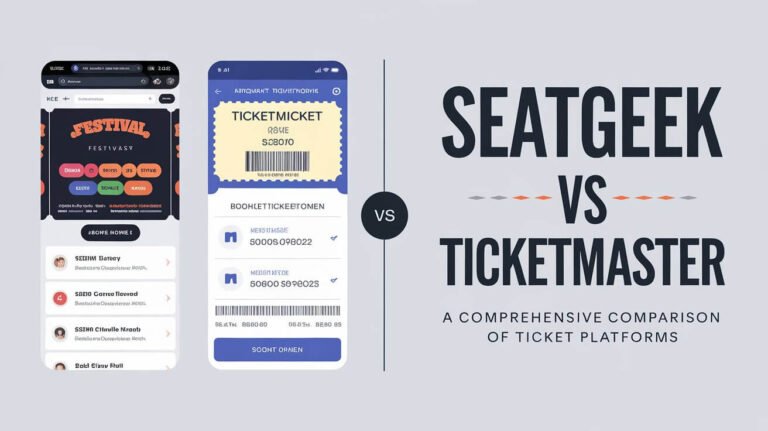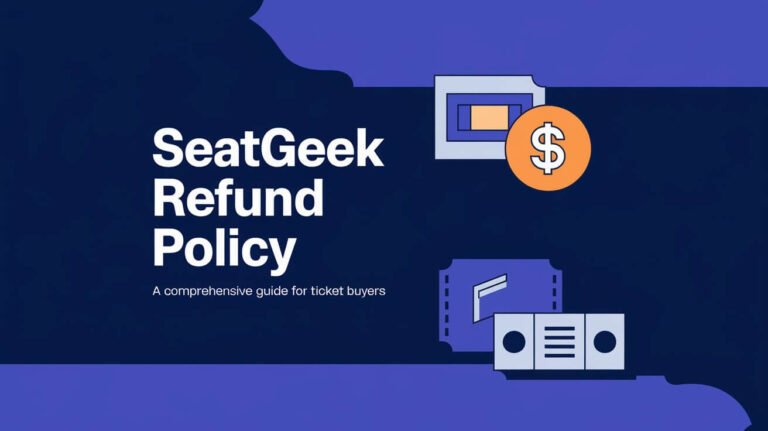SeatGeek Fees: Ultimate Guide to Ticket Costs and Savings

SeatGeek fees typically range from 20-30% of the ticket price, varying based on factors like event type, demand, and seller status. This guide covers everything you need to know about these charges, from understanding the fee structure to finding ways to minimize costs.
Buying tickets online has become the norm for concerts, sports events, and shows. SeatGeek, a popular ticketing platform, offers a wide selection of events, but like most services, it comes with fees. Let’s dive into the world of SeatGeek fees and uncover how they work, what affects them, and how you can make smart choices when purchasing tickets.
What Are SeatGeek Fees?
SeatGeek fees are additional charges added to the base ticket price when you buy through their platform. These fees help cover the costs of running the service and paying sellers.
Types of Fees on SeatGeek
- Service Fees: These make up the bulk of SeatGeek’s charges.
- Delivery Fees: Costs associated with getting your tickets to you.
- Facility Charges: Some venues tack on extra fees.
How SeatGeek Fees Compare to Other Ticketing Platforms
SeatGeek’s fees are generally in line with industry standards. They’re often lower than StubHub’s, which charges a flat 10% to buyers, plus delivery fees. Ticketmaster’s fees can vary widely, sometimes exceeding SeatGeek’s rates.
Understanding the SeatGeek Fee Structure
Knowing how SeatGeek calculates fees can help you budget for your ticket purchases more effectively.
Service Fees Explained
Service fees on SeatGeek usually range from 20-30% of the ticket price. For a $100 ticket, you might pay $20-$30 in service fees. These fees can fluctuate based on various factors, which we’ll explore later.
Delivery Fees Breakdown
Most SeatGeek tickets are digital, which often means no delivery fee. However, some events might have a small charge for electronic delivery. Physical tickets, when available, typically incur higher delivery fees.
Additional Charges to Consider
Don’t forget about taxes! Depending on your location and the event, you might need to pay sales or entertainment taxes on top of SeatGeek’s fees.
Factors Affecting SeatGeek Fees
Several elements influence the fees you’ll pay on SeatGeek. Understanding these can help you find better deals.
Event Type and Popularity
High-demand events like playoff games or sold-out concerts often come with higher fees. Less popular events might have lower fees to encourage sales.
Ticket Prices and Demand
Generally, more expensive tickets have higher fees in terms of dollar amount, but the percentage might be lower. As demand increases, fees may rise too.
Seller Status and Pricing Strategies
Some sellers on SeatGeek have special status, which can affect fees. Professional sellers might have different fee structures compared to individual resellers.
How to View SeatGeek Fees Before Purchasing
SeatGeek offers ways to see fees upfront, helping you avoid surprises at checkout.
Using the “Prices with Fees” Filter
On SeatGeek’s website and app, you can toggle a filter to show prices with fees included. This feature gives you a clear picture of the total cost from the start.
Reading the Fee Breakdown at Checkout
Before you finalize your purchase, SeatGeek provides a detailed breakdown of all fees. Take a moment to review this information to understand exactly what you’re paying for.
Tips for Minimizing SeatGeek Fees
While you can’t avoid fees entirely, there are ways to reduce their impact on your wallet.
Timing Your Ticket Purchase
Ticket prices, and consequently fees, can fluctuate. Sometimes, buying early gets you better deals. Other times, last-minute purchases can score you discounts. Research trends for your specific event type.
Exploring Different Seating Options
Fees often correlate with ticket prices. Sometimes, slightly less desirable seats have much lower fees, potentially offering better overall value.
Taking Advantage of Promotions and Discounts
SeatGeek occasionally offers promo codes or runs sales events. Keep an eye out for these opportunities to save on fees and ticket prices.
SeatGeek’s Fee Policy and Refunds
Understanding SeatGeek’s refund policy for fees is crucial before making a purchase.
When Are Fees Refundable?
In most cases, SeatGeek fees are non-refundable. However, if an event is canceled outright, you should receive a full refund, including fees.
Non-Refundable Fee Scenarios
For postponed or rescheduled events, fees typically aren’t refunded. Always check the specific event’s policy before buying tickets.
SeatGeek Fees for Sellers
If you’re looking to sell tickets on SeatGeek, it’s important to understand how seller fees work.
Listing Fees vs. Sale Fees
Good news for sellers: SeatGeek doesn’t charge listing fees. You only pay when your tickets sell. The standard seller fee is 10% of the ticket price.
How Seller Fees Impact Ticket Prices
Sellers often factor in SeatGeek’s fees when setting prices. This can lead to higher ticket prices, but it ensures sellers receive their desired amount after fees.
The Technology Behind SeatGeek’s Pricing
SeatGeek uses advanced technology to determine pricing and fees, aiming to balance fairness for buyers and sellers.
Dynamic Pricing and Its Effect on Fees
SeatGeek employs dynamic pricing, which means ticket prices and fees can change based on real-time demand. This system aims to find the optimal price point for both buyers and sellers.
Deal Score Feature and Value Assessment
SeatGeek’s unique Deal Score feature rates ticket listings from 1 to 10, considering factors like price, seat location, and historical data. This can help you find tickets with the best value, potentially saving on overall costs including fees.
Comparing SeatGeek Fees to Competitors
To truly understand if SeatGeek’s fees are competitive, let’s compare them to other major players in the ticketing industry.
SeatGeek vs. StubHub: Fee Showdown
While SeatGeek’s fees vary, they’re often lower than StubHub’s. StubHub charges buyers a flat 10% fee plus delivery charges, which can add up quickly for expensive tickets.
How SeatGeek Stacks Up Against Ticketmaster
Ticketmaster, being both a primary and secondary market, has a complex fee structure. Their fees can sometimes exceed SeatGeek’s, especially for high-demand events. However, for some events, Ticketmaster might offer lower fees due to direct relationships with venues.
Transparency in SeatGeek’s Fee Structure
Transparency in pricing has become a hot topic in the ticketing industry. Let’s see how SeatGeek addresses this issue.
All-In Pricing vs. Drip Pricing
SeatGeek offers an all-in pricing option, showing the total cost including fees upfront. This contrasts with drip pricing, where fees are added at the end, which can lead to unpleasant surprises for buyers.
Legal and Ethical Considerations
The ticketing industry faces increasing scrutiny over fee transparency. SeatGeek’s approach of offering all-in pricing options aligns with growing consumer and regulatory demands for clearer pricing in ticket sales.
The Future of SeatGeek Fees
As the ticketing industry evolves, so too might SeatGeek’s fee structure. Let’s look at potential changes on the horizon.
Potential Changes in Fee Structures
With increasing competition and consumer awareness, SeatGeek might explore new fee models. This could include more transparent pricing, loyalty programs, or bundled services to justify fees.
Industry Trends and Consumer Expectations
Consumers are demanding more transparency and value from ticketing platforms. SeatGeek may need to adapt its fee structure to meet these changing expectations and stay competitive in the market.
Frequently Asked Questions About SeatGeek Fees
Let’s address some common questions and concerns about SeatGeek fees.
Common User Concerns Addressed
Q: Are SeatGeek fees negotiable? A: Generally, no. Fees are set by SeatGeek’s algorithms and policies.
Q: Can I avoid paying fees on SeatGeek? A: While you can’t entirely avoid fees, you can minimize them by using the strategies we’ve discussed.
Q: Are SeatGeek fees higher for last-minute purchases? A: Not necessarily. Fees are based on ticket prices, which may go up or down as the event approaches.
Expert Insights on Fee Management
Ticketing industry experts suggest:
- Always compare prices across multiple platforms
- Look for all-in pricing to avoid surprises
- Consider the total cost, not just the base ticket price, when evaluating deals
Navigating SeatGeek Fees for the Best Ticket-Buying Experience
Understanding SeatGeek fees is key to making informed ticket purchases. While fees are an unavoidable part of online ticket buying, knowing how they work can help you find the best deals and avoid surprises.
Remember these key points:
- Use the “Prices with Fees” filter for transparency
- Compare total costs, not just base prices
- Time your purchases strategically
- Look out for promotions and discounts
By keeping these tips in mind, you can navigate SeatGeek fees more effectively and enjoy your events without breaking the bank. Happy ticket hunting!




